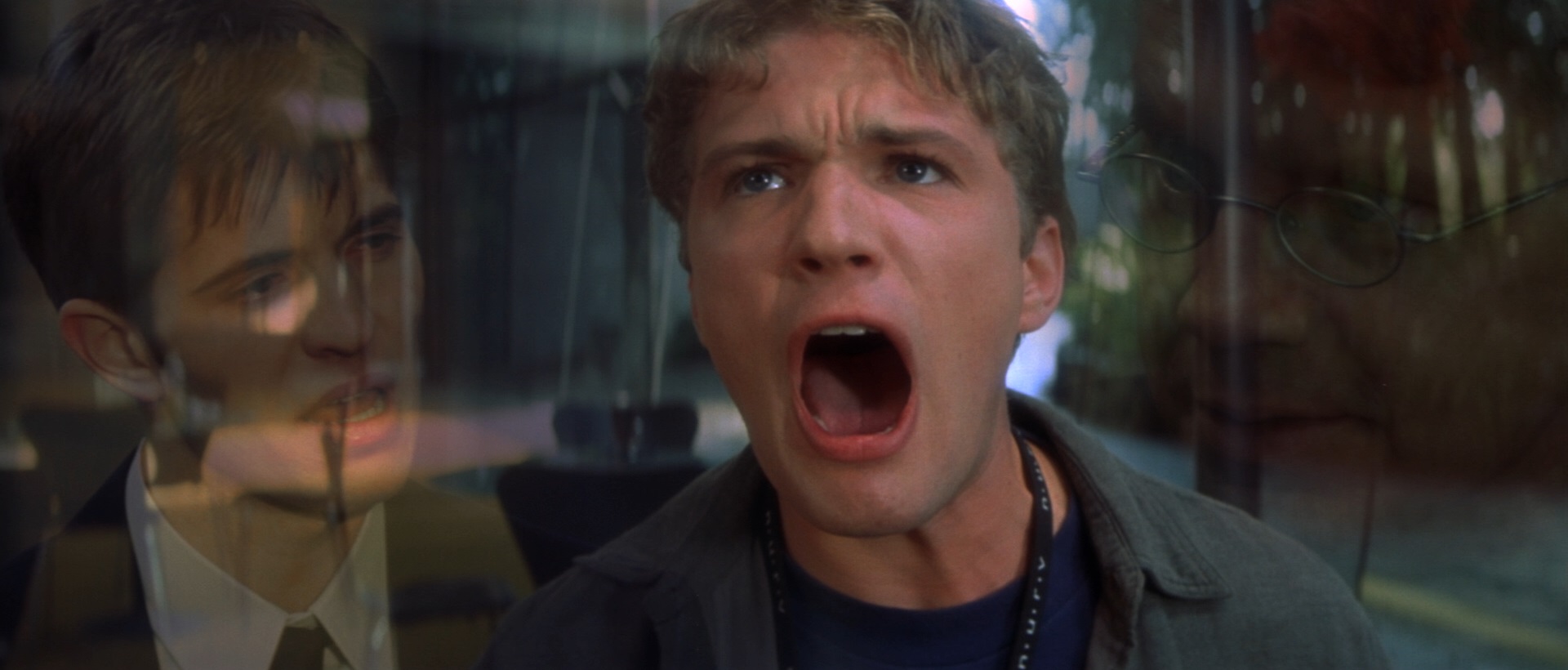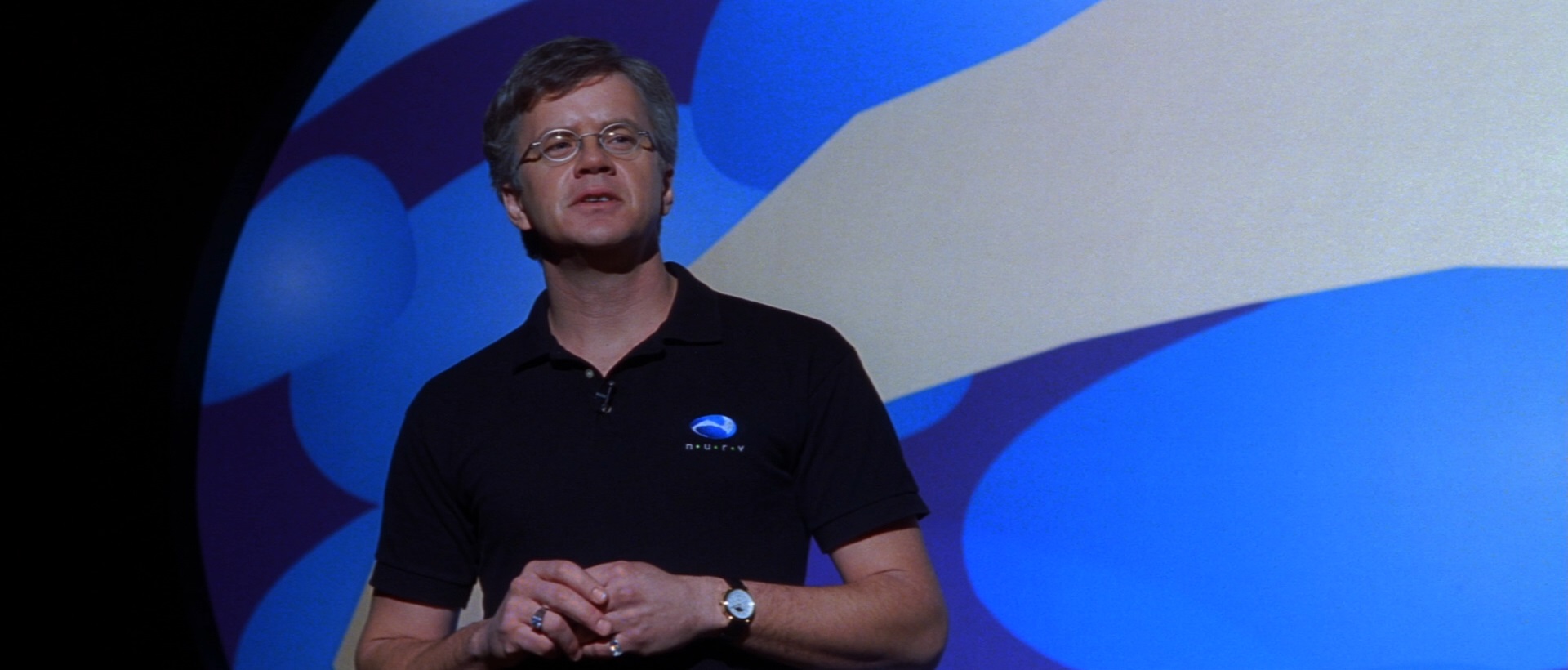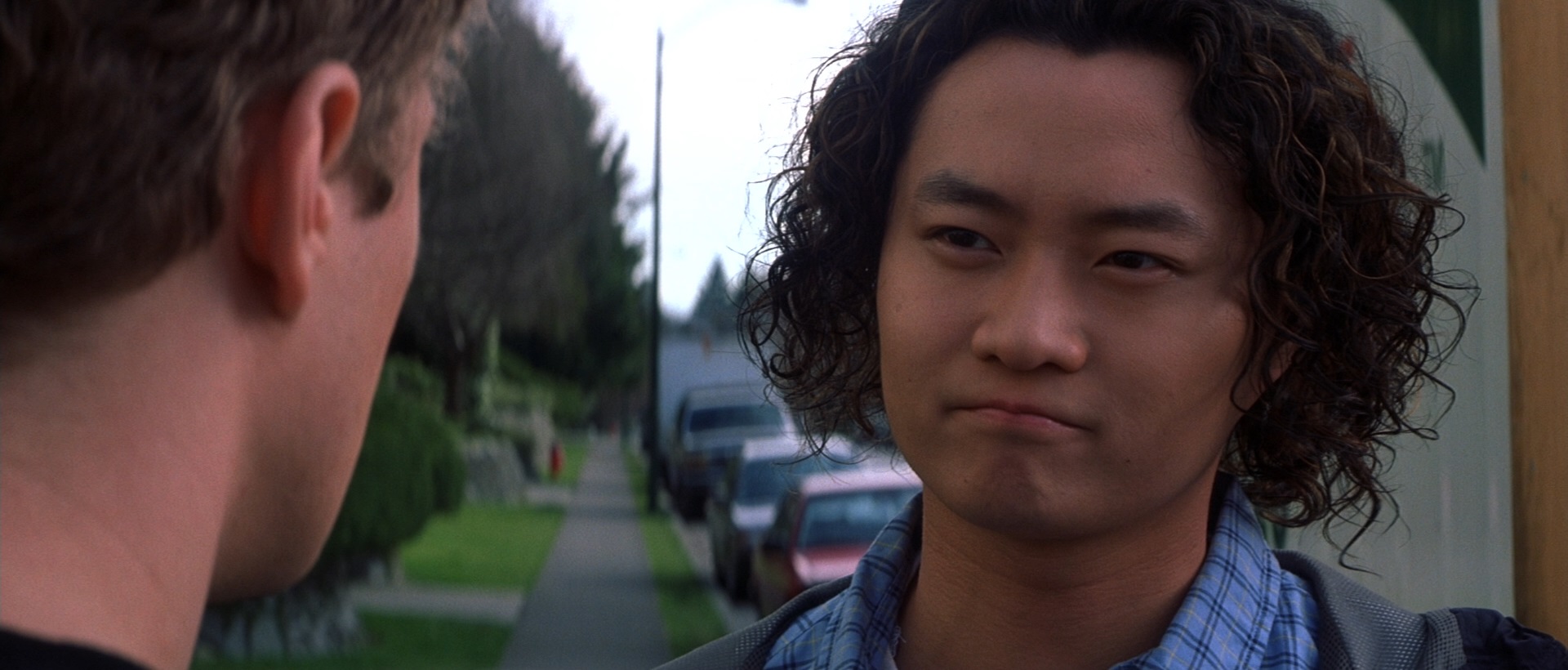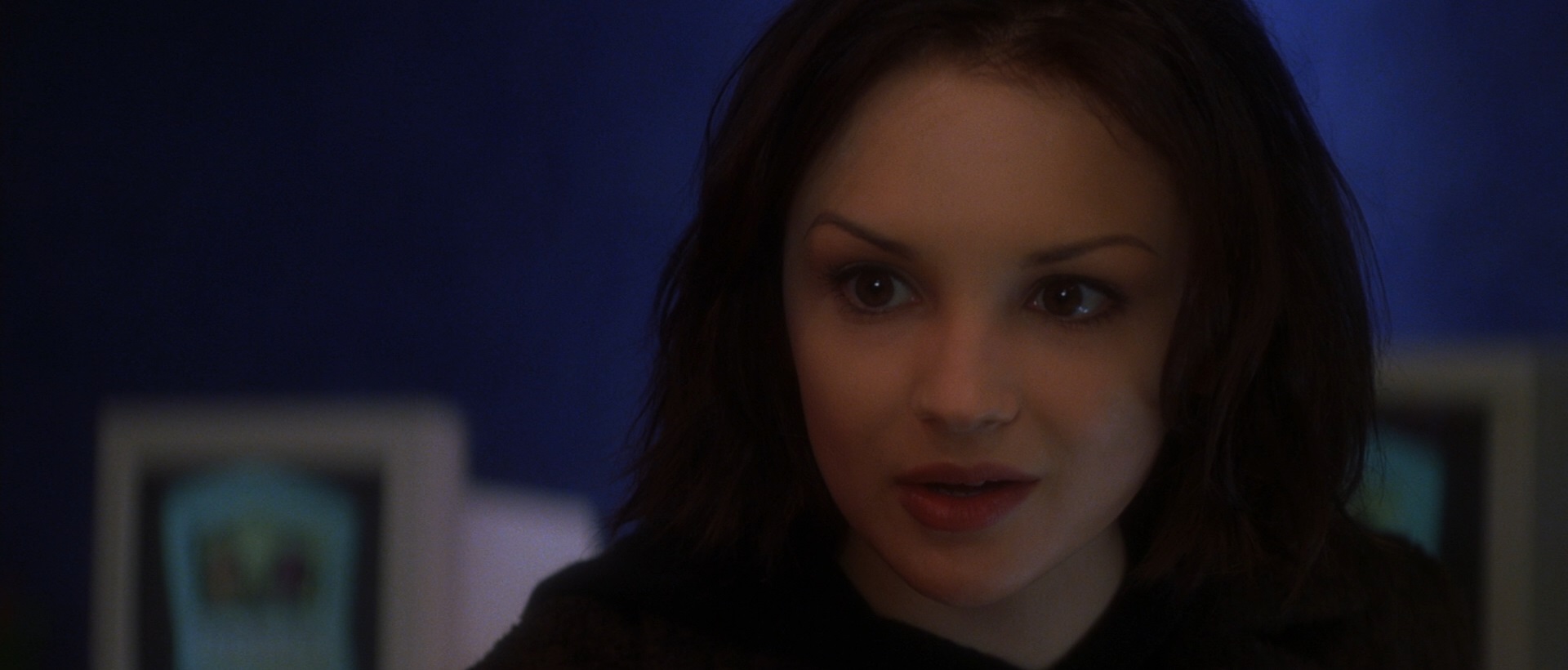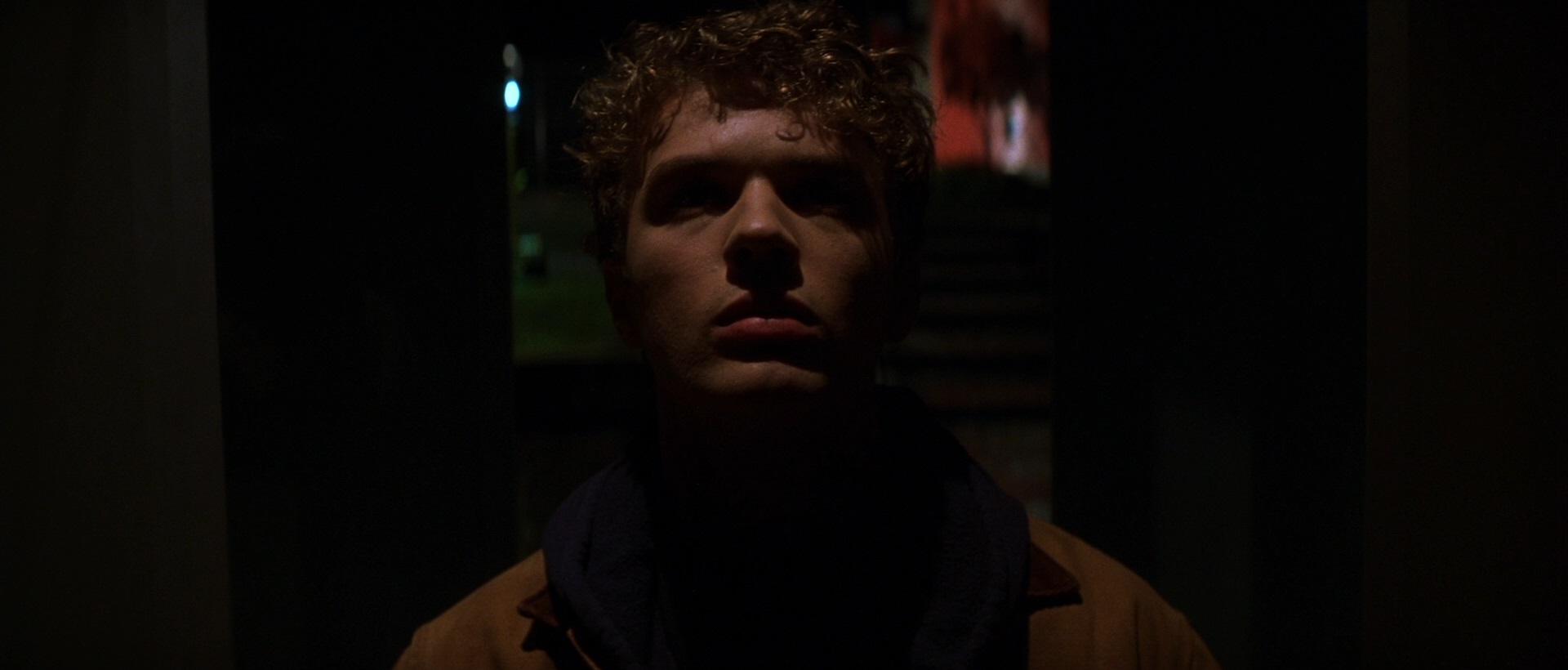| Reviews & Columns |
|
Reviews DVD TV on DVD Blu-ray 4K UHD International DVDs In Theaters Reviews by Studio Video Games Features Collector Series DVDs Easter Egg Database Interviews DVD Talk Radio Feature Articles Columns Anime Talk DVD Savant Horror DVDs The M.O.D. Squad Art House HD Talk Silent DVD
|
DVD Talk Forum |
|
|
| Resources |
|
DVD Price Search Customer Service #'s RCE Info Links |
|
Columns
|
|
|
Antitrust
Olive Films // PG-13 // September 22, 2015
List Price: $29.95 [Buy now and save at Amazon]
Milo goes to college. Milo graduates from college. Milo gets a start-up going with several of his closest friends and collaborators, freely sharing the source code of their media delivery platform with the world and making a modest living by charging for tech support.
That was the plan, anyway. Milo (Ryan Phillippe) just can't resist the siren call of billionaire-who-knows-how-many-times-over Gary Winston (Tim Robbins). While his estranged friends at Skullbocks are hoping to one day give their software away for free, Milo is feverishly trying to meet the overly ambitious launch date of Synapse and add billions more to NURV's corporate coffers. No matter how massive a warchest NURV may have, a failed launch for the mega-hyped Synapse -- a platform to beam any media to any device -- could break the company. As Winston is so keen on saying in his keynote addresses, a couple of geeks in a garage could dethrone them at any moment. But hey, why sweat it? Whenever Milo hits a snag, Winston always shows up to hand his protégé a CD-R teeming with new source code holding the answer. Ssssshhh! Don't ask Winston where he got it, though! It's a sore subject, and I'm sure it doesn't have anything to do with the rash of murdered computer programmers lighting up the 6 o'clock news. When one of those corpses turns out to be his best friend (Yee Jee Tso), Milo starts to open his eyes. NURV is always watching. NURV is always listening. Everyone that Milo thinks he can trust is secretly on their payroll. Hell, he can't even leak it to the press; NURV has its corporate tentacles wrapped around every media conglomerate the world over. Milo does have two things, though: (1) the help of a misunderstood UX designer (Rachael Leigh Cook), and (2) a hell of a plan to sever NURV once and for all.
On paper, anyway, Antitrust looks promising. In stark contrast to dreck like The Net, yet another tech-oriented thriller that inevitably devolves into someone being chased by guys with machine guns, Antitrust shies away from Big Action Beats. It instead draws tension from the fear of being discovered...from not being able to trust anyone around you...from knowing that wherever you go or whatever you do, someone's watching and listening. It advocates open source software in an era when, to most people, GPL was just three random letters from the alphabet. The film is in many ways a direct response to Microsoft's Halloween documents outlining a strategy to disrupt the open source movement. The charismatic tech mogul that Tim Robbins portrays here is so transparently modeled after you-know-who that I'm surprised they settled for reversing his initials rather than just calling him Gil Bates. At the same time, Antitrust isn't aggressively anti-capitalist, making a case for Winston's continued pursuit of wealth and the good he's brought to the world as well. There's a sincere effort to get as many technical details right as possible, and you're seeing real source code (not the usual stream of HTML posing as such), genuine UNIX commands, user interfaces mostly grounded in the real world, and a refusal to just rattle off a bunch of jargon the movie doesn't really understand.
That's to be respected and all, but where Antitrust goes wrong is that it's a thriller with far too few thrills. The specifics of NURV's illegal activities strain credulity. There's a little bit of hand-waving to explain away why NURV can't just buy these garage companies' tech, but the lengths they take -- and I'll keep it spoiler-friendly here -- have an extremely high risk of exposure, a significant risk of failure (even someone working remotely or shifting in their seat the wrong way), would require a staff capable of interpreting and translating the stolen material to something usable enough to make it to one of Winston's CD-Rs (not everyone in 2001 was writing server-side apps in Java, thankfully), and has to come at a mindblowing price tag. The list goes on and on from there -- say, that secret corporate Intranet with "die chink" helpfully hyperlinked -- but I figure it's about time to move on.
Tim Robbins runs away and steals every last scene he's in, and it's not the least bit difficult to understand how his Winston could so easily seduce Milo towards thedarkcorporate side. Disappointingly few other characters make that same sort of impression, though. Milo in particular is woefully underwritten. If you asked me to describe him without some variation of "handsome", "clever", "good guy", or "sesame seed allergy", I'd be at a total loss. Harry Caul he's not. I wish the character's intelligence beamed more brightly; we're told what a genius Milo is, and there are all sorts of "oooh, that's good" platitudes as Winston peers at the source code he's written, but that's never really felt. Claire Forlani is certainly there as the girlfriend he's drifting away from, and Rachael Leigh Cook gets all sorts of screentime as Milo's plucky sidekick. There are brief moments of fleshing them out -- Alice cooking a meal for the first time as a peace offering; Milo uncovering the reason Lisa is seen as so aloof -- but despite their earnest performances, Forlani and Cook are generally treated as plot devices more than characters.
The twists and turns of the best paranoid thrillers really aren't anywhere to be found, unless you count yet another of Milo's allies revealed to be under NURV's thrall or someone slowly walking towards the room as he clacks aways at a keyboard for the twenty-seventh time. For crying out loud, the movie builds to a climax by who can read off a list of IP addresses the fastest. If only Antitrust had as much respect for the audience's intelligence as it did towards getting hackers' approval of generally insignificant details; the moment when Milo finally clues in is needlessly quadruple-underlined with flashbacks, voiceovers, and superimposed floating heads in case we missed the completely fucking obvious.
Not only does Antitrust flounder as a paranoid thriller, but it's not even ridiculous in all the right ways as Hackers. As nice as this new Blu-ray release looks, Antitrust is too lukewarm and forgettable a thriller to rate anything more than a rental. Rent It.
Video
I haven't had a chance to dig my nearly fifteen year old DVD of Antitrust out of storage to do a direct comparison, but I'd expect the differences to be rather colossal. Antitrust looks as if it's been newly remastered, boasting a strikingly robust palette, a very fine sheen of grain, and an impressive level of detail. I mean:
Despite being such a technology-centric movie, Antitrust still draws from quite a few old-school film techniques, including optical dissolves that unavoidably result in some degradation on either side of the effect. Aside from that -- and, sure, some VFX that are showing their age -- this Blu-ray disc looks fantastic. Its AVC encode has been lavished with a remarkably high bitrate, and there's not a sputter or stutter to be found. A tiny bit of speckling is visible, though it's far too light to ever rate as intrusive. What Olive Films has delivered here is vastly superior to anything I ever would've expected. Nicely done.
Antitrust arrives on a dual-layer Blu-ray disc at an aspect ratio of 2.35:1.
Audio
On the other hand, I'm not nearly as bowled over by Antitrust's 24-bit, six-channel DTS-HD Master Audio soundtrack. It's a fairly limp mix, never really baring its teeth and snarling. It just lacks that gloss and that presence I'm so used to hearing in lossless audio. The surrounds rarely draw much attention to themselves, with one of the few exceptions being that swirling "whooosh!" as the full nature of the conspiracy finally dawns upon Milo. In one key sequence with a violent beating and a startup's office being trashed, the rear channels don't reinforce any of the action at all, content instead to just dish out some more chugging, downtuned guitars. The lower frequencies are passable, but this isn't the type of movie that's hellbent on rattling the room. Dialogue is balanced well enough, though, and there's no clipping even throughout the reams of shouted dialogue. Perfectly listenable but decidedly underwhelming.
The only other audio option is a commentary track. No subtitles this time around.
Extras
There's no indication of any extras at all on the packaging, but Antitrust does indeed carry over all of the bells and whistles from MGM's 2001 DVD release.
The Final Word
Though Antitrust's open source advocacy and thirst for technical accuracy are commendable, it's just far too tepid a thriller to recommend with any real enthusiasm. Rent It.
That was the plan, anyway. Milo (Ryan Phillippe) just can't resist the siren call of billionaire-who-knows-how-many-times-over Gary Winston (Tim Robbins). While his estranged friends at Skullbocks are hoping to one day give their software away for free, Milo is feverishly trying to meet the overly ambitious launch date of Synapse and add billions more to NURV's corporate coffers. No matter how massive a warchest NURV may have, a failed launch for the mega-hyped Synapse -- a platform to beam any media to any device -- could break the company. As Winston is so keen on saying in his keynote addresses, a couple of geeks in a garage could dethrone them at any moment. But hey, why sweat it? Whenever Milo hits a snag, Winston always shows up to hand his protégé a CD-R teeming with new source code holding the answer. Ssssshhh! Don't ask Winston where he got it, though! It's a sore subject, and I'm sure it doesn't have anything to do with the rash of murdered computer programmers lighting up the 6 o'clock news. When one of those corpses turns out to be his best friend (Yee Jee Tso), Milo starts to open his eyes. NURV is always watching. NURV is always listening. Everyone that Milo thinks he can trust is secretly on their payroll. Hell, he can't even leak it to the press; NURV has its corporate tentacles wrapped around every media conglomerate the world over. Milo does have two things, though: (1) the help of a misunderstood UX designer (Rachael Leigh Cook), and (2) a hell of a plan to sever NURV once and for all.
On paper, anyway, Antitrust looks promising. In stark contrast to dreck like The Net, yet another tech-oriented thriller that inevitably devolves into someone being chased by guys with machine guns, Antitrust shies away from Big Action Beats. It instead draws tension from the fear of being discovered...from not being able to trust anyone around you...from knowing that wherever you go or whatever you do, someone's watching and listening. It advocates open source software in an era when, to most people, GPL was just three random letters from the alphabet. The film is in many ways a direct response to Microsoft's Halloween documents outlining a strategy to disrupt the open source movement. The charismatic tech mogul that Tim Robbins portrays here is so transparently modeled after you-know-who that I'm surprised they settled for reversing his initials rather than just calling him Gil Bates. At the same time, Antitrust isn't aggressively anti-capitalist, making a case for Winston's continued pursuit of wealth and the good he's brought to the world as well. There's a sincere effort to get as many technical details right as possible, and you're seeing real source code (not the usual stream of HTML posing as such), genuine UNIX commands, user interfaces mostly grounded in the real world, and a refusal to just rattle off a bunch of jargon the movie doesn't really understand.
That's to be respected and all, but where Antitrust goes wrong is that it's a thriller with far too few thrills. The specifics of NURV's illegal activities strain credulity. There's a little bit of hand-waving to explain away why NURV can't just buy these garage companies' tech, but the lengths they take -- and I'll keep it spoiler-friendly here -- have an extremely high risk of exposure, a significant risk of failure (even someone working remotely or shifting in their seat the wrong way), would require a staff capable of interpreting and translating the stolen material to something usable enough to make it to one of Winston's CD-Rs (not everyone in 2001 was writing server-side apps in Java, thankfully), and has to come at a mindblowing price tag. The list goes on and on from there -- say, that secret corporate Intranet with "die chink" helpfully hyperlinked -- but I figure it's about time to move on.
Tim Robbins runs away and steals every last scene he's in, and it's not the least bit difficult to understand how his Winston could so easily seduce Milo towards the
The twists and turns of the best paranoid thrillers really aren't anywhere to be found, unless you count yet another of Milo's allies revealed to be under NURV's thrall or someone slowly walking towards the room as he clacks aways at a keyboard for the twenty-seventh time. For crying out loud, the movie builds to a climax by who can read off a list of IP addresses the fastest. If only Antitrust had as much respect for the audience's intelligence as it did towards getting hackers' approval of generally insignificant details; the moment when Milo finally clues in is needlessly quadruple-underlined with flashbacks, voiceovers, and superimposed floating heads in case we missed the completely fucking obvious.
Not only does Antitrust flounder as a paranoid thriller, but it's not even ridiculous in all the right ways as Hackers. As nice as this new Blu-ray release looks, Antitrust is too lukewarm and forgettable a thriller to rate anything more than a rental. Rent It.
Video
I haven't had a chance to dig my nearly fifteen year old DVD of Antitrust out of storage to do a direct comparison, but I'd expect the differences to be rather colossal. Antitrust looks as if it's been newly remastered, boasting a strikingly robust palette, a very fine sheen of grain, and an impressive level of detail. I mean:
Despite being such a technology-centric movie, Antitrust still draws from quite a few old-school film techniques, including optical dissolves that unavoidably result in some degradation on either side of the effect. Aside from that -- and, sure, some VFX that are showing their age -- this Blu-ray disc looks fantastic. Its AVC encode has been lavished with a remarkably high bitrate, and there's not a sputter or stutter to be found. A tiny bit of speckling is visible, though it's far too light to ever rate as intrusive. What Olive Films has delivered here is vastly superior to anything I ever would've expected. Nicely done.
Antitrust arrives on a dual-layer Blu-ray disc at an aspect ratio of 2.35:1.
Audio
On the other hand, I'm not nearly as bowled over by Antitrust's 24-bit, six-channel DTS-HD Master Audio soundtrack. It's a fairly limp mix, never really baring its teeth and snarling. It just lacks that gloss and that presence I'm so used to hearing in lossless audio. The surrounds rarely draw much attention to themselves, with one of the few exceptions being that swirling "whooosh!" as the full nature of the conspiracy finally dawns upon Milo. In one key sequence with a violent beating and a startup's office being trashed, the rear channels don't reinforce any of the action at all, content instead to just dish out some more chugging, downtuned guitars. The lower frequencies are passable, but this isn't the type of movie that's hellbent on rattling the room. Dialogue is balanced well enough, though, and there's no clipping even throughout the reams of shouted dialogue. Perfectly listenable but decidedly underwhelming.
The only other audio option is a commentary track. No subtitles this time around.
Extras
There's no indication of any extras at all on the packaging, but Antitrust does indeed carry over all of the bells and whistles from MGM's 2001 DVD release.
- Audio Commentary: Director Peter Howitt and Academy Award winning editor Zach Staenberg chime in with a decent commentary track. The conversation is at its most interesting as Howitt and Staenberg delve into the construction of the movie: how nearly everything at the opening was among the last footage shot, for instance, as well as a frantic sequence where Staenberg was instructed not to fret about continuity and the actors were unshackled from meticulous blocking. There are also some terrific comments about more subtle uses of CG imagery and the locations / set design as a whole. Howitt further notes that the sequence that scored the highest during test screenings was just one man with a keyboard: no action, no guns, no chases. Howitt does fall into the trap of narrating what's happening on-screen more than anything else, which comes as a disappointment since he clearly has more to say than that.
- Cracking the Code (22 min.; SD): Antitrust's lengthy making-of featurette suffers from some of the same flaws, squandering too much of its runtime by recapping the plot and explaining who these characters are. "Cracking the Code" in some ways feels as if it's meant more for people who haven't seen the film, but at the same time, every single beat of the plot is spoiled, so...I don't know. Wading through that unnecessary filler, there are some inspired comments about how Antitrust strives for technical accuracy, how the actors were seeing on-screen graphics as cameras rolled rather than everything being pasted in during post-production, and a pre-Thirteen Catherine Hardwicke delving into the production design.
- Deleted Scenes (11 min.; SD): Peter Howitt mentions in his commentary that a more pronounced love triangle between Milo, Lisa, and Alice was gutted out of the final cut, and the rise of one relationship and the decline of another comprise a good bit of the material in this eleven minute reel. The platonic bond between Milo and Lisa is...well, something else entirely here. The etymology of NURV is explained, Lisa gets caught fiddling with some satellite dishes, there's a whole video-game-as-metaphor deal between Milo and Gary, and a slightly extended ending has even been tossed in for good measure. Antitrust is better off without these scenes, although there's an attempt at throwing viewers off one character's trail that might've worked pretty well if it'd been left in.
- Music Video (4 min.; SD): "When It All Goes Wrong Again" sure is an Everclear song, alright.
- Trailer (2 min.; SD): Rounding out the extras is a rough looking theatrical trailer.
The Final Word
Though Antitrust's open source advocacy and thirst for technical accuracy are commendable, it's just far too tepid a thriller to recommend with any real enthusiasm. Rent It.
|
| Popular Reviews |
| Sponsored Links |
|
|
| Sponsored Links |
|
|
| Release List | Reviews | Shop | Newsletter | Forum | DVD Giveaways | Blu-Ray | Advertise |
|
Copyright 2024 DVDTalk.com All Rights Reserved. Legal Info, Privacy Policy, Terms of Use,
Manage Preferences,
Your Privacy Choices | |||||||









